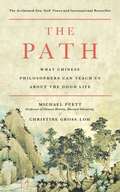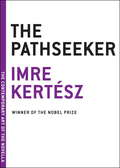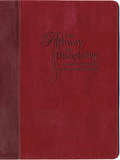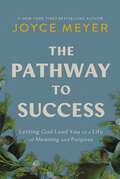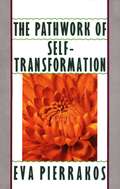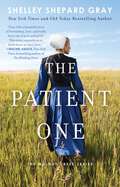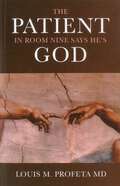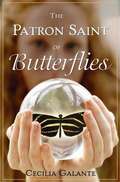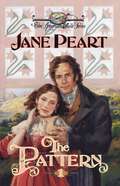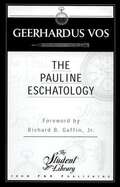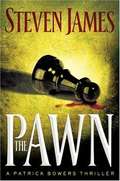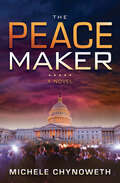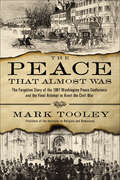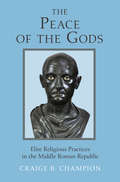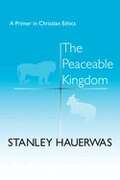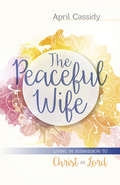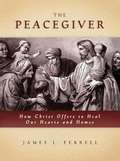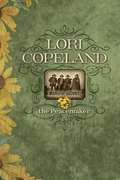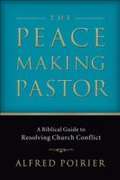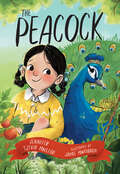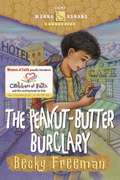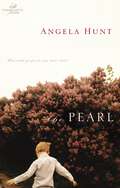- Table View
- List View
The Path: What Chinese Philosophers Can Teach Us About the Good Life
by Christine Gross-Loh Michael PuettFor the first time an award-winning Harvard professor shares his wildly popular course on classical Chinese philosophy, showing you how these ancient ideas can guide you on the path to a good life today. Why is a course on ancient Chinese philosophers one of the most popular at Harvard? It’s because the course challenges all our modern assumptions about what it takes to flourish. This is why Professor Michael Puett says to his students, “The encounter with these ideas will change your life. ” As one of them told his collaborator, author Christine Gross-Loh, “You can open yourself up to possibilities you never imagined were even possible. ” These astonishing teachings emerged two thousand years ago through the work of a succession of Chinese scholars exploring how humans can improve themselves and their society. And what are these counterintuitive ideas? Good relationships come not from being sincere and authentic, but from the rituals we perform within them. Influence comes not from wielding power but from holding back. Excellence comes from what we choose to do, not our natural abilities. A good life emerges not from planning it out, but through training ourselves to respond well to small moments. Transformation comes not from looking within for a true self, but from creating conditions that produce new possibilities. In other words, The Path upends everything we are told about how to lead a good life. Above all, unlike most books on the subject, its most radical idea is that there is no path to follow in the first place—just a journey we create anew at every moment by seeing and doing things differently. Sometimes voices from the past can offer possibilities for thinking afresh about the future.
The Pathseeker
by Tim Wilkinson Imre Kertesz"There's no such thing as chance...only injustice."From the winner of the Nobel Prize for Literature for "writing that upholds the fragile experience of the individual against the barbaric arbitrariness of history..." The acclaimed Hungarian Holocaust survivor Imre Kertész continues his investigation of the malignant methodologies of totalitarianism in a major work of fiction. In a mysterious middle-European country, a man identified only as "the commissioner" undertakes what seems to be a banal trip to a nondescript town with his wife--a brief detour on the way to a holiday at the seaside--that turns into something ominous. Something terrible has happened in the town, something that no one wants to discuss. With his wife watching on fearfully, he commences a perverse investigation, rudely interrogating the locals, inspecting a local landmark with a frightening intensity, traveling to an outlying factory where he confronts the proprietors ... and slowly revealing a past he's been trying to suppress. In a limpid translation by Tim Wilkinson, this haunting tale lays bare an emotional and psychological landscape ravaged by totalitarianism in one of Kertsz's most devastating examinations of the responsibilities of and for the Holocaust.From the Trade Paperback edition.
The Pathway To Discipleship
by Johnny HuntBegin and end each day focused on the presence of God. Whether starting out the day or winding down for the night, staying connected to the presence and work of God is the most important thing a believer can do. The Pathway to Discipleship is a perfect resource for men and women alike for daily devotions and prayer. It is the third book in the bestselling devotional prayer book series. After an introduction by Johnny Hunt (former Southern Baptist Convention president), each of the 51 contributing pastors and evangelists share a week's worth of devotions and prayers, all centering around discipleship and the way an active and vibrant Christian is to live. Each week includes a prayer journal page with writing/prayer prompts. The handsome leatherflex design is beautiful for any desk or nightstand, keeping the precious time spent with the Savior as close as one's fingertips.
The Pathway to Success: Letting God Lead You to a Life of Meaning and Purpose
by Joyce MeyerRenowned Bible teacher and #1 New York Times bestselling author Joyce Meyer shows readers how to realign their perspective on success to conform with God&’s vision for the kind of life that brings us true purpose and lasting joy. The world tells us that having a good job, owning your own business, money, fame, and influence are all important for a successful life. If we don&’t have them, we feel like a failure. But even when we achieve them, we still end up unhappy, unfulfilled, or lonely. God wants us to be successful, but His definition of success is not the same as the world's definition. The truth is, God&’s way of achieving the dreams and desires that truly fulfill us and bring genuine joy to our lives is very different—and that is what we need. In The Pathway to Success, you will discover a deeper understanding of what it means to seek success God's way. Through her practical, relatable insights based on God&’s Word, beloved Bible teacher Joyce Meyer reveals how to actively pursue the keys to true, lasting success. Full of rich encouragement and timeless wisdom, The Pathway to Success will allow you to refocus your life and fulfill your God-given destiny as you walk out the purpose He&’s planned for you.
The Pathwork of Self-Transformation
by Eva PierrakosFor more than twenty years, noted therapist Eva Pierrakos was the channel for a spirit entity known only as the Guide. Combining rare psychological depth and insight with an inspiring vision of human possibility, the Guide's teachings, known as the Pathwork, have influenced many New Age thinkers. Now the core teachings of the Guide have been collected in one volume synthesizing its essential wisdom.
The Patient One (Walnut Creek Series, The #1)
by Shelley Shepard GraySeven former best friends reunite and struggle to heal after the tragic death of one of their own in this evocative and heartrending novel from the New York Times bestselling author of The Gift and Her Secret. When word had gotten out that Andy Warner had committed suicide, everyone in Walnut Creek, Ohio, had been shocked. For seven men and women in their twenties, some Amish, some Mennonite, and some English, each of whom had once counted his or herself as one of Andy&’s best friends, it had been extremely painful. And, maybe, a source of guilt. Years have passed since they&’d all been together last. Some of them got into trouble. A couple got into arguments. Eventually they all drifted apart. But even though none of them really saw each other anymore, there was a steadfast certainty that they&’d always have each other&’s backs—even when no one else did. Their bond was that strong…until Andy did the unthinkable. Now the seven remaining friends, still reeling from Andy&’s death, have vowed to look after each other again. As far as they&’re concerned, it doesn&’t matter that they&’re now in their twenties and have drifted far apart. They need to connect again…for Andy. With her signature &“taut writing&” (RT Book Reviews), Shelley Shepard Gray delivers a lyrical and heartfelt tale of friendship and forgiveness.
The Patient in Room Nine Says He's God
by Louis ProfetaA young Jewish doctor prays to a coma patient's Blessed Mother on Christmas Eve, only to have the woman suddenly awakened; there is the voice that tells a too-busy ER doctor to stop a patient walking out, discovering an embolus that would have killed him. The late-night passing of a beloved aunt summons a childhood bully who shows up minutes later, after twenty-five years, to be forgiven and to heal a broken doctor. This ER doctor finds God's opposite in: a battered child's bruises covered over by make-up, a dying patient whose son finally shows up at the end to reclaim the man's high-top sneakers, the rich or celebrity patients loaded with prescription drugs from doctor friends who end up addicted. But, his real outrage is directed at our cavalier treatment of the elderly, If you put a G-tube in your 80-year-old mother with Alzheimer's because she's no longer eating, you will probably have a fast track to hell.
The Patron Saint of Butterflies
by Cecilia GalanteAgnes and Honey have always been best friends, but they haven't always been so different. Agnes loves being a Believer. She knows the rules at the Mount Blessing religious commune are there to make her a better person. Honey hates Mount Blessing and the control Emmanuel, their leader, has over her life. The only bright spot is the butterfly garden she's helping to build, and the journal of butterflies that she keeps. When Agnes's grandmother makes an unexpected visit to the commune, she discovers a violent secret that the Believers are desperate to keep quiet. And when Agnes's little brother is seriously injured and Emmanuel refuses to send him to a hospital, Nana Pete takes the three children and escapes the commune. Their journey begins an exploration of faith, friendship, religion and family for the two girls, as Agnes clings to her familiar faith while Honey desperately wants a new future.
The Pattern (The American Quilt Series #1)
by Jane PeartJohanna Shelby could never have anticipated where that "fateful encounter" would lead her. She could not have known then how love for the young, rough-hewn, mountain doctor would cause her to turn her back on her privileged lifestyle, threaten to estrange her from her family, and bring her to the wild mountains of Appalachia. If she had known . . . But no! Nothing could hold her back. Not her adoring, worried parents. Not her snooty, so-called "friends." Not even her own flashes of doubt and fear. No, this love would not be denied. It was part of a larger pattern -like the pattern of one of the family quilts her aunts and cousins met weekly to stitch. Into those quilts went not just fabric, but meanings and memories; and when they were finished, the were more than just quilts- they were life stories. Johanna did not know what the future held. But she trusted God. . . And she knew that he would cause her own family quilt to be rich and beautiful -a pattern like no other.
The Pauline Church and the Corinthian Ekklēsia: Greco-Roman Associations in Comparative Context (Society for New Testament Studies Monograph Series)
by Richard LastMoving past earlier descriptions of first-century Christ groups that were based on examining the New Testament in isolation from extant sources produced by analogous cult groups throughout Mediterranean antiquity, this book engages with underexplored epigraphic and papyrological records and situates the behaviour of Paul's Corinthian ekklēsia within broader patterns of behaviour practiced by Greco-Roman associations. Richard Last's comparative analysis generates highly original contributions to our understanding of the social history of the Jesus movement: he shows that the Corinthians were a small group who had no fixed meeting place, who depended on financial contributions from all ten members in order to survive, and who attracted recruits by offering social benefits such as crowns and office-holding that made other ancient cult groups successful. This volume provides a much-needed robust alternative to the traditional portrayal of Pauline Christ groups as ecclesiastically egalitarian, devoid of normative honorific practices, and free for the poor. Features new readings of problematic passages in the Corinthian correspondence. Provides fresh insight into recruitment to early Christianity. Presents a new taxonomical model for associations, churches, and synagogues.
The Pauline Eschatology
by Geerhardus VosTo unfold Paul's eshatology, argues Vos, one must set forth his theology as a whole, not just his teaching on Christ's return. Offers great insight into the structure of Pauline theology.
The Pawn
by Steven JamesThe Illusionist watched as Patrick Bowers wandered around the top of the mountain with those federal agents and idiot cops. He knew about Patrick Bowers, PhD. He grinned. He almost giggled.
The Peace Maker: A Novel
by Michele ChynowethThe Bible story of Abigail and David reimagined as a twenty-first century novel of ruthless political ambition and devastating family secrets. A provocative and timely thriller in which the fate of the world depends on a single election. Leif Mitchell has gone from a humble life as a stable hand and country rock singer to become Governor of Kentucky. Now he&’s running as the Republican candidate for the Presidency. The contender: US democratic Senator Darren Richards. But its Richards&’ wife Chessa who is privy to not only her husband&’s damaging secrets, but also a vengeful plan of attack by Mitchell to bring down his opponent by any means necessary. As the increasingly vicious campaign escalates, the &“high road&” to victory is all but destroyed. Now it&’s up to Chessa to try and preserve peace on both sides. But more than the futures of Richards and Mitchell are in question. The likely First Lady is putting herself the middle of a political crossfire in which her own life could be at risk.
The Peace That Almost Was: The Forgotten Story of the 1861 Washington Peace Conference and the Final Attempt to Avert the Civil War
by Mark TooleyA narrative history of the 1861 Washington Peace Conference, the bipartisan, last-ditch effort to prevent the Civil War, an effort that nearly averted the carnage that followed. In February 1861, most of AmericaÆs great statesmenùincluding a former president, dozens of current and former senators, Supreme Court justices, governors, and congressmenùcame together at the historic Willard Hotel in a desperate attempt to stave off Civil War.Seven southern states had already seceded, and the conferees battled against time to craft a compromise to protect slavery and thus preserve the union and prevent war. Participants included former President John Tyler, General William ShermanÆs Catholic step-father, General Winfield Scott, and LincolnÆs future Treasury Secretary, Salmon Chaseùand from a room upstairs at the hotel, Lincoln himself. Revelatory and definitive, The Peace That Almost Was demonstrates that slavery was the main issue of the conferenceùand thus of the war itselfùand that no matter the shared faith, family, and friendships of the participants, ultimately no compromise could be reached.
The Peace of the Gods: Elite Religious Practices in the Middle Roman Republic
by Craige B. ChampionThe Peace of the Gods takes a new approach to the study of Roman elites' religious practices and beliefs, using current theories in psychology, sociology, and anthropology, as well as cultural and literary studies. Craige Champion focuses on what the elites of the Middle Republic (ca. 250–ca. 100 BCE) actually did in the religious sphere, rather than what they merely said or wrote about it, in order to provide a more nuanced and satisfying historical reconstruction of what their religion may have meant to those who commanded the Roman world and its imperial subjects.The book examines the nature and structure of the major priesthoods in Rome itself, Roman military commanders' religious behaviors in dangerous field conditions, and the state religion's acceptance or rejection of new cults and rituals in response to external events that benefited or threatened the Republic. According to a once-dominant but now-outmoded interpretation of Roman religion that goes back to the ancient Greek historian Polybius, the elites didn't believe in their gods but merely used religion to control the masses. Using that interpretation as a counterfactual lens, Champion argues instead that Roman elites sincerely tried to maintain Rome's good fortune through a pax deorum or "peace of the gods." The result offers rich new insights into the role of religion in elite Roman life.
The Peaceable Kingdom: A Primer in Christian Ethics
by Stanley M. HauerwasWhile this book is meant to be a primer or introduction to Christian ethics which I hope can be used both in introductory courses in college and by adult study groups, I am not providing a survey of what various ethicists think on current issues in the field. Nor will I offer any extensive analysis of past and current figures in Christian ethics. Instead this book is an introduction in the sense that it attempts to present one straightforward account of a Christian ethic.
The Peaceful Mom: Building A Healthy Foundation With Christ As Lord
by April CassidyToo many mothers long for peace but despair that it always seems out of reach. The stress of motherhood overwhelms their attempts to be the Christlike mom they aspire to be. Now moms can take heart: no matter where they are on their parenting journey, every mom can experience the power of Christ in a personal way that will radically change their lives, their outlook, their power source, and their approach to motherhood—and every other relationship as well.April Cassidy, author of The Peaceful Wife, returns to discuss how the peace of Christ can be found in the next stage of life. Rather than writing a how-to book on parenting, The Peaceful Mom is a guide for moms to lead by example.She first shows readers how to have their hearts and minds right with the Lord and to experience peace with God as their new normal. Then from that place of spiritual communion, April teaches moms how this peace helps them relate to their children in healthy, godly ways. Through their own flourishing relationship with Christ, moms can model God's peace in their family dynamics even amid everyday challenges and stress. Cassidy offers tangible, detailed steps to spiritual growth that any mother can follow.For moms who are ready to receive the healing and transformation available to them through Jesus, this book will open their eyes to see all of life--not just parenting--from a fresh, life-giving perspective.
The Peaceful Wife: Living in Submission to Christ as Lord
by April CassidyIn today's world, women are often rewarded for having type A personalities. Driven, demanding women achieve higher positions, better salaries, and praise for their ambition. They learn to be confident, take-charge leaders who can handle anything on their own. Yet when it comes to their marriages, those same traits can backfire. After all, no one goes into marriage hoping for a promotion. What is a wife to do?April Cassidy knows this struggle firsthand. She thought she was a great Christian wife and begged God to make her passive husband into a more loving, involved, godly leader. Instead, God opened her eyes to changes that she needed to make, such as laying down her desire for control and offering genuine, unconditional respect--not just love--to her husband. The Peaceful Wife focuses on Cassidy's experience and its life-changing properties, providing a template for others to follow.Cassidy's conclusions may be as shocking to readers as they were to her, but she backs up her own tale with stories from her blog readers, and also includes recommendations for further study. She walks through baby steps on how to change, addressing questions such as:*What is respect?*How can you show respect?*How is being respectful different from being loving?In the end, The Peaceful Wife is a powerful path to God's design for women to live in full submission to Christ as Lord.
The Peacegiver: How Christ Offers to Heal Our Hearts and Homes
by James L. Ferrell"What does the atonement mean, practically speaking? How is Christ the answer to a strained relationship with a spouse, child, parent, or siblings? What if I am being mistreated--how can the atonement help me cope with that? How can I discover the desire to repent when I don't feel the need to repent? And how can I invite others to do the same? These are the challenging, difficult questions of daily life, questions to which the gospel must provide answers if it is to have living, cleansing, redeeming power. The Peacegiver is a book about the answers to these questions. Unlike other books about the atonement, The Peacegiver is written as an extended parable. It tells the story of a man struggling, with the help of a loved one, to come unto Christ. In reading the rich details of his often difficult journey, we find ourselves embarked on a personal journey of our own. His questions are our questions; his problems, our problems; his discoveries, our discoveries. Along the way, the truths of the gospel are unfolded with surprising clarity and power, illuminating aspects of the atonement that few of us have ever heard or considered before. These surprising implications show us the way to deep and lasting peace in our hearts and homes." Even though this story is fictional, the author substantiates his points through Biblical scriptures and Mormon texts.
The Peacemaker
by Ken SandeThis book is a practical guide for all Christians who seek to bring Christ's exhortation, "Blessed are the peacemakers," into their relationships. Attorney Ken Sande is executive director of Peacemaker Ministries. He regularly conciliates business, family employment, and church disputes and serves as a consultant to pastors and attorneys as they work to resolve conflicts outside the courtroom. Sande conducts seminars throughout the United States on biblical conflict resolution. Note: The indexes did not scan properly, and were therefore deleted.
The Peacemaker
by Lori CopelandBull-headed Wynne Elliot has one goal in mind: to track down Cass Claxton and shoot him dead for leaving her at the altar and running off with her money. But when Cass's brother Cole shows up, Wynne finds herself on an unexpected adventure, and she just might lose her heart. Beloved author Lori Copeland takes readers back in time to an era when cowboys were heroes and the rules of the Wild West prevailed. Lori's trademark blend of humor, romance, and Christian content make this an irresistible read.
The Peacemaking Pastor: A Biblical Guide to Resolving Church Conflict
by Alfred PoirierEvery pastor faces conflict in the church, and Alfred Poirier has this loving reminder: we can run, but we can't hide. Jesus set the example as the Incarnate Peacemaker, and Scripture clearly calls his servant-pastors to be ministers of reconciliation. So the issue is not whether to be a mediator but what kind of mediator to be.
The Peacock (Orca Echoes)
by Jennifer Tzivia MacLeodKey Selling Points It's the aftermath of World War II in Toronto and 10-year-old Barbara realizes that, while her father's away helping Jewish refugees in Europe, she has to be the one to solve the problem of the peacock living in their back garden before the winter comes. The Peacock delves into the experience of being Jewish in 1947 in Canada, what it was like to be a child during the war, the treatment of refugees by the world at large, and how the acts of kind individuals can make huge positive change. This historical fiction chapter book takes on a less-represented period of history, just after World War II, shining a light on the displaced persons living in encampments in Europe and what people tried to do to help, from the viewpoint of a Jewish Canadian family. The metaphor of the peacock (a stand-in for the refugees Barbara's father is helping) gives readers an entry point to think about displaced people but in a lighthearted way (with a happy ending). A bonus glossary will be online for readers interested in extra background about the book's context. Contains 22 black-and-white illustrations.
The Peanut-Butter Burglary (Camp Wanna Bannana #4)
by Becky Freeman David ClarWhen you live at the best Christian youth camp around-Camp Wanna Banana-life is filled with adventure, excitement-and fun! Join ten-year-old twins Jake and Joy; Joy's pet spider monkey, Munch-Munch; and their "twibling" friends, Marco and Maria, as they solve a whole series of mysteries in and around Camp Wanna Banana.First, food starts disappearing from Miss Nellie's café. Then lumber walks away from Mr. Henley's hardware store. Always ready to solve a mystery, the Two Amigos Detectives, Marco Garcia and Jake Bigsley, set out to catch the odd thief. It appears to be an open-and-shut case. All the clues point to Mr. Klem, whose large family is poor by most standards. But Marco, friends with one of the Klem girls, can't bring himself to accuse the head of such a happy family. When a surprise comes to Tall Pines, however, the case takes a sudden turn. In the days that follow, a revelation rocks the town and Marco's understanding of what it means to be rich is challenged as he and Jake work to solve the crazy case of the Peanut-Butter Burglar.From the Trade Paperback edition.
The Pearl
by Angela Elwell HuntShe had the perfect life until the accident. Now science offers an opportunity to replace what she has lost--but at what cost?Diana and Steve Sheldon had it all--successful careers, nice home, a lovely teenage daughter, an adorable five-year-old son. But when a freak accident ravages their happy family, Diana, a professional radio counselor, finds herself viewing the world through new eyes of grief--and accepting ideas and situations she would have considered unacceptable only a few weeks before.When a research foundation offers to restore her loss through a medical marvel, Diana is convinced she has found the answer to her family's anguish. Determined to sacrifice anything that stands between her and healing for her broken heart, she proceeds along a dangerous course, never dreaming that healing might prove more destructive than hurt...As timely as today's newspaper, The Pearl is an honest, heart-rending look at life and faith through a contemporary mother's eyes.
